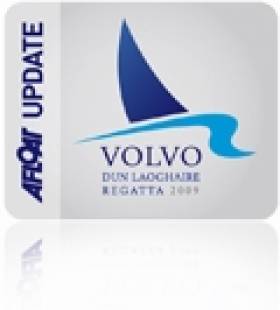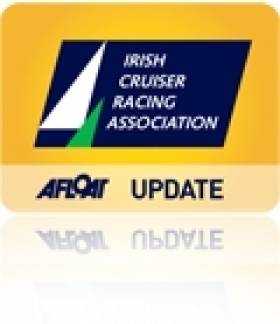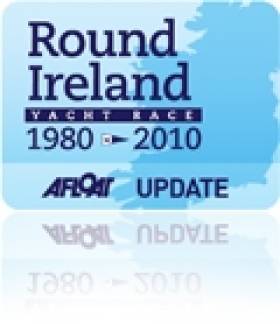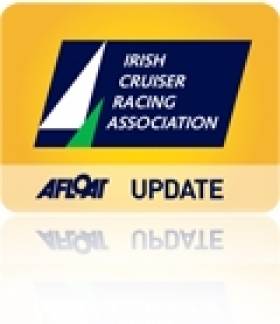Displaying items by tag: Irish Cruiser Racing Association
First entries in for Volvo Dun Laoghaire Regatta
July's Volvo Dun Laoghaire regatta has taken in 22 entries six months ahead of the first race. It's an encouraging figure that's on a par with the 2009 VDLR, the biggest regatta in Irish sailing that year.
The positive early response is an indication, says organiser Adam Winkelmann, that the 2011 fleet, should be a bumper one too when it sets sail on July 7th for the four day event.
The emphasis is again on providing quality racing over different courses each day but organisers are also aiming to live up up to the regatta's pre-event billing as a 'Mega Party'.
The event has opened a new website, a new Facebook page (with afloat.ie, so if you're a Facebook user please show your support and 'like it'). The regatta site is also featuring the youtube clip below of events on the bay two years ago.
So far entries received are spread across nine separate classes but it's a visiting Wayfarer fleet with eight boats named already that is setting the pace. The organisers are expecting up to 50 of the two man classic design for the class National Championships that's being staged as part of the regatta.
The notice of race (NOR) was published online in October and highlighted a reduced entry fee for 'earlybird entries'. Click HERE. or scroll down to download it as a PDF. If you participated in 2009 and entered online, this year you only need to enter your email address.
Three boats are entered in the non spinnaker class and another three in the Squib keelboat. Two entries have been received in both IRC 2 and 3.
It's still too early for a table of bands to be decided but the organisers intend to give some indication of handicap break-ups as the entries build. The IRC bands will be in line with those laid down by the Irish Cruiser Racing Association.
Despite the fact the regatta's strength since 2007 is that it draws on the capital's own fleet of 400 boats it is in fact visitors from elsewhere on the east coast that are first in. East Down Yacht Club, for example, has four entries.
But locals are signing up too. Single entries have been received in the Mermaid, Beneteau 31.7, Dragon and IRC Zero classes.
Course areas are likely to stay the same according to principal Race officer con Muphy of the National YC. Th race team is Alan Crosbie - KYC, Peter Crowley - RCYC,
David Lovegrove - HYC, Harry Gallagher - HYC, Henry Leonard - RIYC, Jack Roy - RIYC and Con Murphy - NYC. Mike Butterfield will head up the jury.
The organisers are on the look out for volunteers to assist in the run up to and during the country's biggest sailing event. In 2009 over 300 helped to make it the biggest participant sport event in the country after the city marathon, with over 3,500 sailors afloat. More details from Ciara in the event office HERE.
National Award for Irish Cruiser Racing Association (ICRA)
In the three decades and more of the Mitsubishi Motors/Irish Independent "Sailing Club of the Year" assessments, there has never been an organization only seven years old winning the title.
In fact, seniority has often won the day, though in a country in which the oldest sailing clubs date from 1720 (Royal Cork) and 1770 (Lough Derg), it's difficult to find clubs and associations which are anything less than centenarians, let alone not yet in double figures.
But it was only as recently as June 2003 that the Irish Cruiser Racing Association came into being. It was at the biennial Sovereign's Cup series in Kinsale that Fintan Cairns of Dun Laoghaire, enthusiastically supported by the late Jim Donegan of Cork and other key personnel, successfully launched the idea of a nationwide organisation to co-ordinate the racing sport of "boats with lids".
At the time, it was a leap of vision. Having successfully headed Dublin Bay Sailing Club at a time of rapid growth, he was able to see the picture more clearly than those who reckoned that offshore racing organisations should be related to bodies of water rather than a land mass, for all that we're on an island.
Then too, the new association was envisaged as using established clubs and their facilities to stage its championship. In other words, the ICRA organising team would be the travelling people of the Irish sailing scene. On top of that, handicap competition with cruiser-racers was derided as "truck racing" by the white hot one design and dinghy sailors.
Yet the idea took hold, and the annual championship was successfully staged at venues as various as Crosshaven, Tralee, Howth, Kinsale and Dun Laoghaire, with Denis Kiely the essential ace number-cruncher in the back office. And in May 2010, with the mighty machine of the Royal St George YC in Dun Laoghaire providing the administrative centre, the Liebherr Irish Cruiser Nationals in Dublin Bay attracted a fleet of 117 boats, with great sailing.
On that event alone, ICRA would have been among the front runners for Club of the Year. But the best was yet to come. In recessionary times, getting a three boat team together to make a worthwhile challenge for the biennial Rolex International Commodore's Cup was a matter of making the best of limited resources. But ICRA – currently under the leadership of Barry Rose of Cork - was up to the job.
The team of Anthony O'Leary's Antix, Dave Dwyer's marinerscove.ie, and Rob Davis and Andrew Creighton's Roxy 6, had a convincing win. Thus ICRA in one season had catered very well for general run of boats and crews at home, and had come out tops at the top level internationally. It doesn't get better than that, and we salute them as Sailing Club of the Year 2011.
Round Ireland Remembered: Saturday Night is Vroon Night
Round Ireland Champ Piet Vroon from Holland is in Wicklow town for Saturday night's celebration of the 30th Round Ireland. Vroon, 80, who has already picked up the Royal Ocean Racing Club's Yacht of the Year award is back in Wicklow and it is certain exploits during Ireland's offshore race in July will be relived when Vroon lifts the Round Ireland trophy at the Park Hotel in Newtownmountkennedy. The Wicklow Sailing Club prize giving includes a new Irish Cruiser Racing Association trophy (ICRA) and the inaugural winner is a local boat, Aquelina (The Tyrrell fmaily) from Arklow.
Among the attendance at the offshore night of the year is 19 crew from visiting UK competitor Malta Puma.
More on the Round Ireland Yacht Race:
Round Ireland Yacht Race 2010 Review
Round Ireland Yacht Race, Ireland's top offshore fixture
A Round up of 80 stories on the 2010 Round Ireland Yacht Race
Offshore Ace Leads Online Boat of the Year Poll
After nearly two weeks of voting Matt Davis offshore sailing achievements in Raging Bull tops the readers opinion poll on ICRA's Boat of the Year award. Since the poll started on October 7th, 900 votes have been cast and the lead at the top of the reader poll has changed several times between Errislannan, Marinercove.ie and ISORA's Raging Bull. You can vote too on the left hand side of the home page of this website. There has also been comment in Afloat's forum section suggesting there should be a number of overall awards HERE.
This morning's opening race of the Liebherr 2010 ICRA National Sailing Championships has kicked off in style on Dublin Bay and although the 120 boat fleet (drawn from 20 clubs) was shrouded in a sea mist for a time race course reports indicate tight racing in southerly breezes of over 10 knots.
Jump Juice in Division Zero damaged her pulpit and at one stage was dealing with a man over board. They have reired from today's racing. A lady crew member from another boat has been brought ashore with two borken teeth.. More updates as we have them. Photos from the race course are on our gallery now.
All classes are underway. Divisions Zero and One have two round the can races, and Divisions two and and three have three windrward leeward races today. the white sail fleets have two round the can races. The fleet is expected back ashore around 4pm.
Photos from this mornings racing by Bob Bateman are already on the Afloat gallery here.

































































